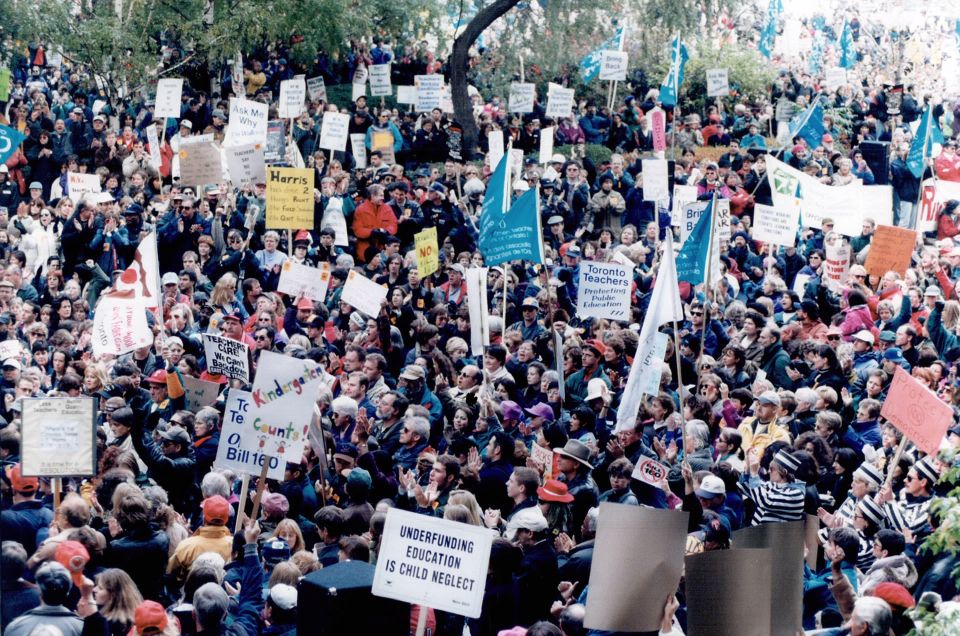Written by BC Public Sector workers.
Two years ago, public sector workers, unable to work from home, were praised by the BC government as heroic, frontline, essential workers ensuring services, health care and K-12 education in the face of a deadly pandemic. Today these same workers are being offered contracts that will see their real wages shrink in the face of the highest inflation rates in a generation.
Workers Need a COLA!
Everything is getting more expensive as inflation continues to rage. The cost of groceries was 10.8 percent higher in August than it was the previous year. The overall inflation rate in Canada last month was 7 percent. That’s less of an increase than the previous month, but it still means everything is more expensive. If wage increases aren’t keeping up with soaring prices, it means that workers can afford fewer goods, and they have taken a cut in pay!
Workers need strong Cost-of-Living Adjustment (COLA) agreements to prevent their living standards falling due to inflation. In the past, unions in Canada fought for COLA clauses in their contracts. During the 1970s, inflation reached 11 percent, but unions fought for COLA. By the end of the decade, nearly half of all workers in Canada were covered by COLA agreements. Unfortunately, over the subsequent decades unions became less vigilant and union leaderships bargained away COLA clauses to the point where in 2014 only one percent of unionized workers were covered by COLA.
Adjusted for inflation, average hourly wages in Canada have barely increased in 40 years. Since the start of the pandemic, two-thirds of Canadian workers have experienced real wage losses. Meanwhile, workers are working harder and smarter than ever before. Productivity continues to increase every decade. Workers obviously deserve higher wages, but the only way to win higher wages is to fight for them. Organizing to win back COLA contracts would be a major victory for workers today.
Winning COLA, Sea to Sky Bus Drivers Show the Way!
Earlier this year in BC’s Sea-to-Sky region, Unifor bus drivers stayed on the picket line until they won a COLA. After the longest transit strike in BC history, lasting 4.5 months, the drivers won a 13.5 percent raise over 5 years and full COLA.
West Vancouver bus drivers of the Amalgamated Transit Union (ATU) 134 wanted to follow the lead of the Sea-to-Sky drivers and voted 99 percent to strike for the same gains. Unfortunately, the ATU 134 leadership showed a total lack of faith in their members’ ability to fight and win and have opted instead for the risky gamble of binding arbitration.
Unity is strength for Government Workers, Nurses and Teachers
There is a huge opportunity now for public sector workers to demand and win COLA as the Main Public Service Agreement is up for negotiation. This agreement covers over 33,000 workers in the BC General Employees’ Union (BCGEU), but the implications of the agreement are huge because it will set the standard for all other public sector unions, including other BCGEU members, the Hospital Employees’ Union (HEU), BC Nurses’ Union (BCNU), the BC Teachers’ Federation (BCTF), many Canadian Union of Public Employees (CUPE) workers and others. Officially, the various unions each negotiate separately with the provincial government. But in reality, all public sector workers are impacted by the Main Public Service Agreement, and the best chance workers have of winning COLA is to fight as one.
Most unions have me-too clauses in their contracts that guarantee them any gains won by the other unions. But workers shouldn’t use this as an excuse not to fight, or to wait and see what others get. Workers from all unions should be taking solidarity actions and joining other union picket lines to form a common front together in the fight for COLA. Otherwise, if one union wins a bad deal, the government will use the me-too clauses as an excuse to enforce it on everyone else. BC public sector workers need to stand together, or they will hang separately.
A Disappointing Start for BC’s biggest Public Sector Unions
The provincial government opened negotiations with the BCGEU with an insulting offer: a flat rate increase of $0.25/hour and a 2 percent raise in 2022, followed by yearly raises of 2-3 percent until 2024. With inflation at 8 percent this amounted to a 6 percent pay cut in 2022. After the union mobilized for a strong vote, the workers voted 95 percent to strike.
But instead of building on this powerful vote, the BCGEU leaders organized a limited strike action of 1,000 workers in the alcohol and cannabis distribution centres — this out of the 33,000 members covered by the contract. After two weeks, the government came back to the negotiating table and reached a tentative agreement with union negotiators. The tentative agreement amounts to a flat rate increase of $0.25/hour and 3.24 percent raise in 2022, followed by yearly cost-of-living raises based on the annualized average of the BC Consumer Price Index (CPI) over 12 months starting on March 1, 2022 of at least 5.5 percent but no more than 6.75 percent in 2023 and between only 2 and 3 percent in 2024. This is a marginal improvement over the original offer, but still represents a real pay cut and is far from the full COLA won by the Sea-to-Sky bus drivers.
Many workers are frustrated with the new tentative agreement that will now have to be approved or rejected in a general vote. It even appears that the BCGEU executive is split on whether this is a good deal because they have not formally recommended that the workers vote to ratify it. Unfortunately, the union leadership made a crucial mistake in suspending the picket lines as soon as bargaining resumed but before the tentative agreement was announced. This was supposed to be a “good-faith gesture,” but in reality, it meant that workers were demobilized, leaving them in a much weaker position to reject a bad deal than they would have been if pickets had stayed up. Following the logic of the me-too clauses in the various contracts, the government has offered similar bad deals to the HEU and the BCTF.
Over the recent months of negotiations, BC’s public sector unions did not organize joint rallies and demos in cities and towns across the province that would bring the nearly 400,000 public sector workers together to demand new contracts that at least match inflation. The only job action of all these workers was 1,000 on strike.
The lack of coordination among public sector unions to win a strong Main Public Service agreement is why the government feels safe in offering a totally inadequate deal. The weakness of the mobilization was demonstrated by the lack of rallies in support of well-paid jobs and high-quality public services and no strong public campaign or solidarity actions involving rank-and-file members. “An injury to one is an injury to all” is the old union saying meant to rally workers together in struggle, but solidarity only works if you organize, and you can only win if you fight.
The BC NDP: Friend of the Workers?
Why are the union leaderships not willing to mobilize against the government and stand together for a strong COLA deal? Many workers think it’s because their leaders are too closely aligned with the BC NDP and are unwilling to seriously challenge them. The BC NDP has demonstrated that it has lost a class perspective. If it understood class, it would automatically offer new contracts that protected living standards. The NDP is supposed to be on the side of workers. If more revenue is needed to cover rising costs due to inflation, the NDP should raise taxes on the wealthy and tax the corporations that are making mega-profits. By not offering full COLA when one is so clearly needed, the BC NDP is showing that it does not take the concerns of regular working people seriously and is in fact taking them for granted politically.
A full COLA would not place upper limits on the wage increases in each of the contract years. Instead, a full COLA would have a direct relationship between the cost of living and wages. It would be measured by the average of the annualized CPI. If anything less is offered, the government in effect is saying that workers should pay for rising costs out of their wages. This is an unacceptable stance for a party that claims to represent the working class.
Instead, the NDP is boasting about its $1 billion budget surplus while refusing to acknowledge the demands of workers who are suffering under a pandemic and cost-of-living crisis. Despite a slight decline in inflation in July, inflation won’t disappear anytime soon due to the ongoing war in Ukraine, resulting food and gas supply crises, semi-conductor shortages, increasing tensions between western and Chinese imperialism over Taiwan, new COVID strains and climate change disasters. By not offering a full COLA, the BC NDP is locking previously celebrated “essential workers” into future real pay cuts.
Rather than trying to ally themselves with the BC NDP, workers should be mobilizing their unions into fighting forces independent of any party that does not staunchly defend workers and their living standards. Of course, the BC Liberals would try to offer a much worse deal for workers, but workers don’t have to accept what one party or the other is willing to give. Instead, by using the power to withhold their labour, workers can fight for what they need.
On the Ground
Socialist Alternative visited the BCGEU picket line in Richmond to show solidarity and talk with workers. We wanted to hear their concerns and give them a voice, as most media were more concerned about alcohol and cannabis shortages resulting from their strike.
All the workers we spoke to were concerned about the rising cost of living and were striking for a COLA in their contract. Workers were frustrated that during the pandemic they received little to no pandemic support payments or relief, despite the NDP’s claims to have supported essential workers. Revenues and taxes generated by liquor and cannabis sales are a substantial source of the BC government’s income, yet distribution workers are forced to live from paycheque to paycheque.
None of the workers expressed concerns about their working conditions, but they unanimously identified insufficient pay and benefits as a major concern. The affordability crisis is literally keeping families apart, as one worker spoke of their inability to find affordable housing large enough to live with their partner’s child.
The cost of living is driving workers to seek employment in other provinces, at the same time staffing shortages are causing major problems. Nurses and teachers are especially feeling the pinch. The BCTF’s warnings of a teacher shortage due to years of pandemic pressures, high costs of living and the second lowest teacher salaries in Canada are being realized with many classrooms without qualified teachers, weeks into the school year. The Alberta government has even launched targeted ads inviting skilled workers to seek higher wages in Alberta.
What This Means for Workers
In Ontario and Québec, conservative Premiers will fight hard to prevent public sector workers from maintaining their living standards in upcoming contract negotiations. Premier Ford imposed a 1 percent cap on public sector wage increases during the pandemic. Premier Legault is set to win the Québec election in a landslide in October and will take this as a popular mandate not to give public sector workers an inch.
The public sector negotiations in BC could have big repercussions on fights in other provinces. If BC government workers, health workers and educators reject the current offer and fight for a better deal, including a full COLA, they could start a movement by showing workers in other provinces what is possible when you fight.




